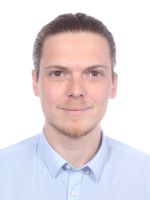Contact
Ludwig-Maximilians-Universität München
Munich Center for Mathematical Philosophy
Lehrstuhl für Logik und Sprachphilosophie
HP 90
Geschwister-Scholl-Platz 1
D-80539 München
Office:
Ludwigstr. 31
Room 123
D-80539 München
Phone:
+49 89 2180-5473
Email:
Levin.Hornischer@lrz.uni-muenchen.de
Website:
https://levinhornischer.github.io/
Further Information
Before joining the MCMP, I was a postdoctoral researcher at the Institute for Logic, Language and Computation (ILLC) at the University of Amsterdam. There I also obtained my PhD with a dissertation on Dynamical Systems via Domains, supervised by Michiel van Lambalgen (Amsterdam) and Franz Berto (St Andrews). The project was funded by my grant on Foundations of Analogical Thinking from the Dutch Research Council (NWO).
Research Interests
The main part of my research is on the foundations of artificial intelligence (AI). Modern neural networks and machine learning algorithms have become both impressively and worryingly powerful, but we’re still lacking a general theory for them. Developing such a theory is a fascinating open problem at the intersection of computer science, math, philosophy, cognitive science, and other subjects. For classical computer programs, this largely has been solved: we understand their possibilities, limitations, complexity, semantics, logic, verification, safety, etc. My approach to this problem is to investigate if analogous aspects of understanding can be developed for the sub-symbolic computation of modern AI. I find it fruitful to view this kind of computation as dynamical systems; and in my PhD thesis, I’ve developed a domain-theoretic semantics for them.
My research interests outside this topic also include, e.g., the philosophy of language (hyperintensionality, synonymy, vagueness) and philosophical logic (multivalued logics, relevance logic, counterfactuals, non-monotonic logics, logical constants). I enjoy using the tools of dynamical systems theory, domain theory, category theory, duality theory, universal algebra, constructive mathematics, modal logic, and formal epistemology—and especially learning new ones.
Selected Publications
- Dynamical Systems via Domains: Toward a Unified Foundation of Symbolic and Non-symbolic Computation (2021). PhD Dissertation. University of Amsterdam, Institute for Logic, Language and Computation.
- The Logic of Information in State Spaces (2021). The Review of Symbolic Logic 14.1, pages 155–186.
- Logics of Synonymy (2020). Journal of Philosophical Logic 49, pages 767–805.
- Toward a Logic for Neural Networks (2019). In: I. Sedlár, & M. Blicha (Eds.), The Logica Yearbook 2018, pages 133–148, London: College Publications.


